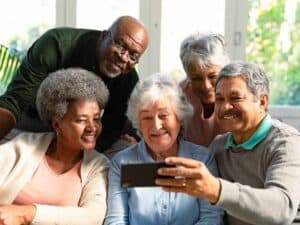We know that people love to learn. It is good for our brains to learn new and novel information and build stronger communities by promoting better mental, physical, social, and emotional wellness. Not only are residents affected by a robust learning program, but also the staff, leadership, and family members.
 Some time ago, we noticed a lot of attention being paid to better brain health. Residents began asking about what that means to someone over the age of 65 and what they should be doing now. Scientists and researchers have been uncovering the importance of healthy eating, daily fitness, and cognitive stimulation as factors that can enhance our brains. An article published in The Gerontologist (2009) titled “Perceptions and Beliefs about the Role of Physical Activity and Nutrition on Brain Health in Older Adults” showed that while most people understand that physical activity and healthy eating can lead to a healthier lifestyle, many were somewhat confused about how they could bring the elements together. In other words, the question is, what does that mean for me?
Some time ago, we noticed a lot of attention being paid to better brain health. Residents began asking about what that means to someone over the age of 65 and what they should be doing now. Scientists and researchers have been uncovering the importance of healthy eating, daily fitness, and cognitive stimulation as factors that can enhance our brains. An article published in The Gerontologist (2009) titled “Perceptions and Beliefs about the Role of Physical Activity and Nutrition on Brain Health in Older Adults” showed that while most people understand that physical activity and healthy eating can lead to a healthier lifestyle, many were somewhat confused about how they could bring the elements together. In other words, the question is, what does that mean for me?
We have worked with senior living organizations to create, implement and sustain lifelong learning programming for the 21st Century for over ten years. The ever-changing and technical nature of today’s programming is increasingly causing organizations to struggle to stay competitive. Learning After 60, COMPASS by WebMD dispels the common way of thinking that an old dog can’t learn new tricks, revealing a study that showed that learning new things can make older adults’ brains 30 years younger in just six weeks! Researchers found that learning three new tasks simultaneously boosts mental power and protects against Alzheimer’s. Therefore, older adults need to keep both the body and mind active and healthy.
Today’s research tells us that engaging in formal learning opportunities offers three significant needs for every community.
First, residents are asking for new and fresh programming. The old “recreational calendar” is a relic of the past; throw it out. Today’s residents want to learn new information to help them live healthier lives.
Second, residents want a healthier lifestyle now. We have to start providing them with information about healthy living, and the best way to do that is to understand that better brain health is accomplished through lifelong learning. Regardless of the topic, participating in a lifelong learning program is the main driver of a healthier brain.
Third, residents want to engage with other people. They are looking for purposeful and meaningful ways to be connected and strengthen their community simultaneously. They don’t want to be isolated and alone; they want to contribute to something bigger.
A March 2022 article published by AARP Research Issues/Topics titled “Lifelong Learning Attracts Older Adults for Personal Health, and Cognitive Health” revealed that people love to learn. “As people seek education, the primary drivers are to gain new knowledge and stay mentally sharp. The concept of cognitive health fuels many to already identify as a lifelong learner, but it also motivates others to express a desire to learn something new in the future.”
Let’s all move forward in the 21st Century to provide every resident, regardless of age or stage in life to feel valued, loved, and connected through lifelong learning.
